-
Title
-
Book of American Negro Spirituals (and Second Book of American Negro Spirituals)
-
This edition
-
"The Book of American Negro Spirituals" . Ed. James Weldon Johnson. Musical arrangements by J. Rosamond Johnson. New York: Viking, 1925. 187 pp.;
"Second Book of Negro Spirituals" . Ed. James Weldon Johnson. Arrangements J. Rosamond Johnson. New York: Viking, 1926. 189 pp.
-
Other editions, reprints, and translations
-
• Repr. combined edition, as "The Books of American Negro Spirituals". New York: Viking, 1940. 187+189 pp.; 5th printing, 1951.
• Repr. combined edition, as "The Books of American Negro Spirituals". New York: DaCapo, 1969, 1977, 2002.
-
Table of contents
-
(First Book):
[James Weldon Johnson] / Preface (begins with his poem "O Black and Unknown Bards") (11-50)
• Go down Moses
• Heav'n boun' soldier
• Joshua fit de battle ob Jerico (56)
• We am clim'in' Jacob's ladder (59)
• Didn't old Pharoah get los'? (60)
• Swing low sweet chariot (62)
• Up on de mountain (64)
• Lit'le David play on yo' harp (65)
• Die in de fiel' (68)
• Ride on, Moses (70)
• All God's chillun got wings (71)
• Dere's no hidin' place down dere (74)
• Gimme dat ol'-time religion (76)
• Lis'en to de lam's (78)
• He's jus' de same today (80)
• Stan' still Jordan (82)
• Somebody's knockin' at yo' do' (85)
• Singin' wid a sword in ma han' (86)
• I couldn't hear nobody pray (89)
• My way's cloudy (92)
• It's me, O, Lord (94)
• I got a home in-a dat rock (96)
• By an' by (98)
• Deep river (100)
• Who dat a-comin' ovah yondah? (104)
• Roll, Jordan, roll (105)
• De blin' man stood on de road an' cried (108)
• Roll de ol' chariot along (110)
• Calvary (112)
• Steal away to Jesus (114)
• Gwine up (118)
• I'm troubled in mind (120)
• O, gambler git up off o' yo' knees (122)
• My Lord's a-writin' all de time (123)
• Git on board, little chillen (126)
• Gwinter sing all along de way (128)
• Who'll be a witness for my Lord! (130)
• Keep a-inchin' along (134)
• Where shall I be when de firs' trumpet soun'! (136)
• Peter, go ring dem bells (137)
• Nobody knows de trouble I see (140)
• Ev'ry time I feel de Spirit
• Father Abraham
• I'm a-rollin' (145)
• Didn't my Lord deliver Daniel? (148)
• O, wasn't dat a wide river? (152)
• Keep me f'om sinkin' down (154)
• De band o' Gideon (156)
• John saw the holy number (158)
• Give me Jesus (160)
• My Lord, what a mornin' (162)
• O, rocks don't fall on me (164)
• Done foun' my los' sheep (167)
• What yo' gwine to do when yo' lamp burn down! (170)
• Hallelujah! (172)
• Crucifixion (174)
• Until I reach-a ma home (177)
• I done done what ya' tol' me to do (180)
• You may bury me in de eas' (181)
• You got a right (183)
• Weary traveler (184)
(Second Book): Preface -- A little talk wid Jesus makes it right -- All I do, de church keep a grumblin' -- Can't you live humble? -- Chilly water -- Come here, Lord! -- Daniel saw de stone -- De angel roll de stone away -- De angels in heab'n gwineter write my name -- Death come to my house, he didn't stay long -- Death's gwineter lay his cold icy nands on me (Familiar version) -- Death's gwineter lay his cold icy nands on me (Rare version) -- De ol' ark's a-moverin' an' I'm goin' home -- De ol' sheep done know de road -- Dere's a han' writin' on de wall -- Do don't touch-a my garment, good Lord, I'm gwine home -- Gimme yo' han' -- God's a-gwineter trouble de water -- Great day -- Gwineter ride up in de chariot soon-a in de mornin' -- Hol' de win', don't let it blow -- Humble yo'self, de bell done ring -- I feel like my time ain't long -- I heard de preachin' of de word o' God -- I know de Lord's laid his hands on me -- I'm gwine up to heab'n anyhow -- In dat great gittin' up mornin' -- I thank God I'm free at last -- I want God's heab'n to be mine -- I want to die easy when I die -- Jubalee -- Look-a how dey done my lord.; Lord, I want to be a Christian in-a my heart -- Mary an' Martha jes' gone 'long -- Mary had a baby, yes, Lord -- Members, don't git weary -- Mos' done toilin' here -- My Lord says he's gwineter rain down fire -- My ship is on de ocean -- My soul's been anchored in de Lord -- Nobody knows de trouble I see (Familiar version) -- Oh, hear me prayin' -- Oh, my good Lord, show me de way -- Oh, yes! Oh, yes! Wait 'til I git on my robe -- Po' mourner's got a home at las' -- Religion is a fortune I really do believe -- Rise, mourner, rise -- Rise up shepherd an' holler -- Run, Mary, run -- Same train -- Sinner, please don't let dis harves' pass -- Sometimes I feel like a motherless child -- Too late -- To see God's bleedin' lam' -- Walk in Jerusalem jus' like John -- Walk, Mary, down de lane -- Walk together children -- Were you there when they crucified my Lord? -- When I fall on my knees -- You go, I'll go wid you -- You mus' hab dat true religion -- 'Zekiel saw de wheel.
-
Reviews and notices of anthology
-
• Du Bois, W. E. B. [Review of "The Book of American Negro Spirituals"] "The Crisis" (Nov. 1925): 31.
-
Google Books
-
"It is one thing for the race to produce artistic material; it is quite another thing for it to produce the ability to interpret and criticize this material. This is particularly true when the artistic gift is a matter of primitive development in the rich childhood of a people. For a long time the Negro had to depend upon white critics for the presentation of his folk songs, and while Allen and White and Krehbiel did excellent work, they lacked the inner knowledge and inspiration which would make their word authoritative. The authors of this book bring these essential things" (31).
"Mr. Johnson's introduction, which runs over forty large pages, is in itself a most entertaining comment on the folk song. He characterizes 'this noble music', defends the Negro as its original creator, examines the origin and 'miracle' of its production. . . . He has a notable explanation of the way in which the new Christian religion came to modify African music in America and make the Negro folk song possible. The process of folk song making is explained with interesting references to 'Ma' White and 'Singing' Johnson" (31).
"The rhythm of the work songs is analyzed and that too of the 'shout' songs and of the dance which has so largely disappeared now from the Negro churches. There is a special attention paid to the fact that the folk songs were harmonized by the singers and not sung in unison as some have assumed, and Mr. Rosamond Johnson and Mr. [Lawrence] Brown have especially brought this out in their renditions, with a great deal of care and with notable success" (31).
"The poetry of the folk songs is illustrated by many quotations, such as 'De blood came twinklin' down', 'Sometimes I feel like a motherless child' and others. There are several pages on Negro dialect and generous acknowledgment of the credit due to those who have helped preserve the Negro spiritual. 'The credit for the first introduction of spirituals to the American public and the world belongs to Fisk University.' The book has words and music of 61 songs. 'The collection here presented is not definitive but we have striven to make it representative of this whole field of music, to give examples of every variety of spiritual'" (31).
"The musical setting as done in this book one must hear to appreciate the peculiarly high and unique quality of the work. Never before have the 'Spirituals' had just this sort of original and yet true musical accompaniment. It is as though something unknown and wild and yet sensed in the song of black folk had been caught and caged forever" (31).
"The book is published by the Viking Press and it is hoped that it will have wide use and vogue" (31).
-
Commentary on anthology
-
• (re 1940 repr. of "Book of American Negro Spirituals" and of "Second Book of Negro Spirituals", as "Books of American Negro Spirituals"): "Although the spirituals included in this two-volume set are more song than poetry, they are nonetheless powerful, often deeply revealing examples of folk verse. Attributed to no author and not specifically dated, these 120 spirituals have been reproduced on the pages in traditional African-American dialect and with careful attention to preserving the original rhythms. They vary considerably in tone and subject, typically evoking the hardships of slavery and a steady faith in God. Full musical notion is included for each spiritual. Some, like 'Swing Low Sweet Chariot' and 'Deep River,' will be known to many readers. The material is neat and accessible, indexed by title only. James Weldon Johnson has written a thorough, interesting introduction to the anthology. He provides a historical setting for the development of Negro spirituals, explaining the relation between African rhythms and the songs passed down among slaves. His introduction is unambiguous without being condescending, and the anthology demonstrates that the black spiritual is an American folk-art form that is skillful and unique" ("The Columbia Granger's Guide to Poetry Anthologies". Ed. William Katz, Linda Sternberg Katz, and Esther Crain. 2nd enlarged ed. New York: Columbia UP, 1994. 7)
-
Item Number
-
A0015 (a and b)
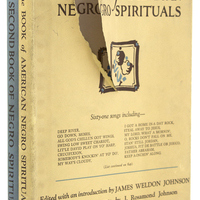 Both volumes, side by side, front cover of first vol. visible
Both volumes, side by side, front cover of first vol. visible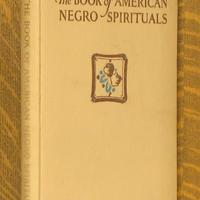 Front cover sans dust jacket, first volume
Front cover sans dust jacket, first volume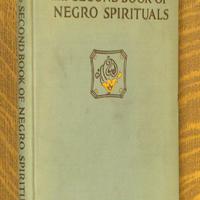 Front cover sans dust jacket, second volume
Front cover sans dust jacket, second volume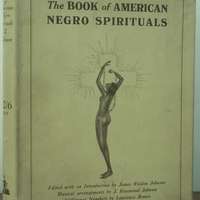 Front cover and spine, first volume (Chapman and Hall ed.)
Front cover and spine, first volume (Chapman and Hall ed.)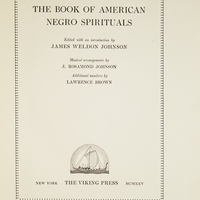 Title page, first volume
Title page, first volume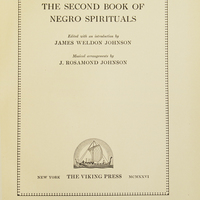 Title page, second volume
Title page, second volume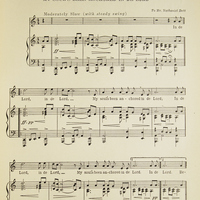 Sample page image (p. 37)
Sample page image (p. 37)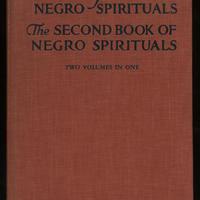 Front cover sans dust jacket, combined ed. (1940)
Front cover sans dust jacket, combined ed. (1940)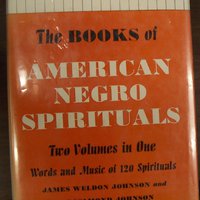 Front cover, combined ed. (Viking 1961)
Front cover, combined ed. (Viking 1961)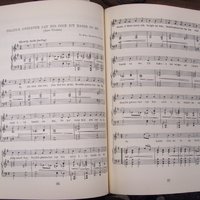 Sample page image (pp. 96-97) (Viking 1961)
Sample page image (pp. 96-97) (Viking 1961)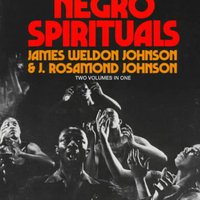 Front cover, combined ed. (Da Capo 1977)
Front cover, combined ed. (Da Capo 1977)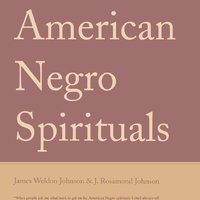 Front cover, combined ed. (Da Capo 2002)
Front cover, combined ed. (Da Capo 2002)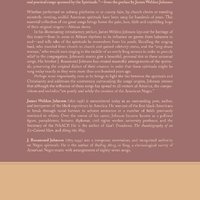 Back cover, combined ed. (Da Capo 2002)
Back cover, combined ed. (Da Capo 2002)











